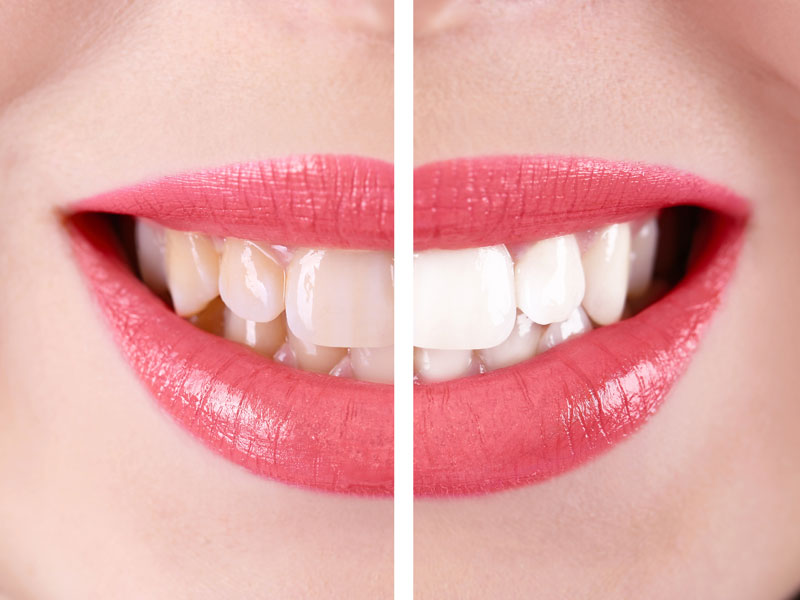If you’re someone who is unhappy with their teeth, particularly because they are discoloured, you are not alone. In fact, nearly half the population feel the same.

It’s no secret then, that a white smile has quickly become one of the most popular dental procedures. With procedures available in dentist surgeries, beauticians and home-kits, many end up opting for cheaper, unregulated products.
Before a tooth whitening procedure is performed, most dentists and hygienists would recommend a scale and polish session first. This treatment removes all superficial staining, accumulated calculus and dental plaque. Most importantly, it will allow your dentist to carry out a periodontal assessment to ensure the tooth whitening treatment is suited to you.
If you’re looking to get your teeth whitened, it’s likely that you’ll have some questions. We’ve put together the top five tooth whitening questions to help you get started.
Does tooth whitening make your teeth sensitive?
The ingredients within tooth whitening products can mean the soft dentin under the hard enamel of your tooth is temporarily exposed. The exposure means the tooth whitening product can access the tooth nerve endings, causing sensitivity for some people.
This is nothing to worry about, as it is usually only temporary and should subside within a couple of days. Unregulated tooth whitening products can cause chemical burns on teeth and gums as well as prolonged sensitivity. Talk to your dentist before you use any tooth whitening products for advice.
How long will my teeth be white for?
The amount of time your teeth will be white for depends on several factors, for example what tooth whitener you have opted for and how you care for your teeth in the months after. On average, your teeth will remain white for around 6-24 months.
To extend the amount of time your teeth are white for, you should avoid smoking, drinking coffee and drinking red wine. Ask your dentist for some advice on how to keep your smile white for as long as possible.
Will tooth whitening damage my tooth enamel?
The conclusive answer is no, tooth whitening will not damage your tooth enamel, though there are things to be wary of. Enamel is the hardest tissue in the human body and although it is the outermost layer of the tooth, it is the layer of tissue beneath this that absorbs the whitening product.
It is important to remember that dental surgeries will use low concentrations of peroxide on your teeth for optimum safety.
Will tooth whitening always work?
The effect tooth whitening has on your teeth depends solely on the original state of the area. Teeth whitening will lighten your existing tooth colour, so you shouldn’t expect your teeth to be sparkling white from one session. It also only works on natural teeth, not dentures, crowns or veneers.
If you have dentures, crowns or veneers that appear discoloured, talk to your dentist for some advice on how to brighten them.
How much does it cost?
The cost of tooth whitening varies between practices and products. It will not normally be covered by the NHS as it is a cosmetic procedure. You should do your research to find the ideal dentist or product that works for you.
Dr Denti dental stain remover is a great way of allowing the natural brightness of your teeth to shine through. It is a mildly abrasive substance that removes stubborn stains and polishes teeth in the process.
For more information on any of the Dr Denti home use or MGS professional products, get in touch with GAP today by visiting our contact page or by calling 01474 560618.